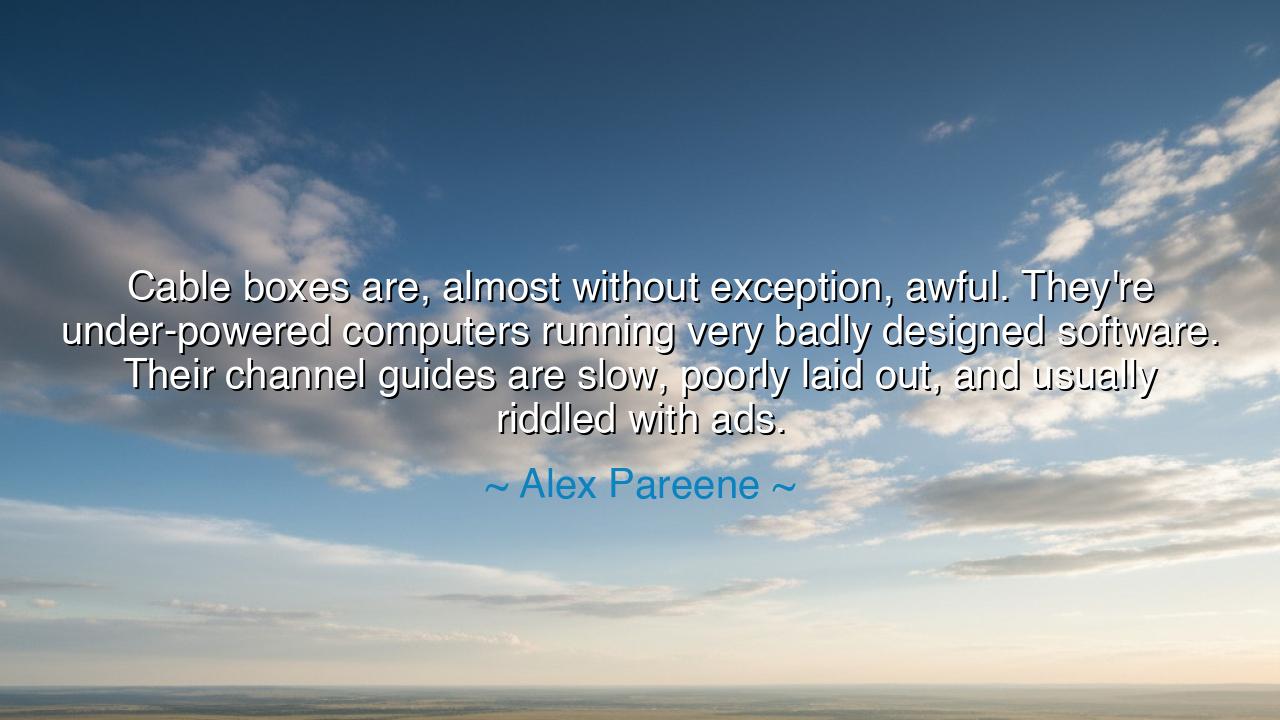
Cable boxes are, almost without exception, awful. They're
Cable boxes are, almost without exception, awful. They're under-powered computers running very badly designed software. Their channel guides are slow, poorly laid out, and usually riddled with ads.






“Cable boxes are, almost without exception, awful. They're under-powered computers running very badly designed software. Their channel guides are slow, poorly laid out, and usually riddled with ads.” — Alex Pareene
Hear now the words of Alex Pareene, a voice of the digital age, who spoke not in poetry but in truth. In this lament of the modern world, he gives voice to a quiet fury—the frustration of those who live amid machines that were meant to serve, but instead enslave through mediocrity. When he declares that cable boxes are awful, he is not merely judging a device; he is pronouncing judgment on an era that traded simplicity for excess, and function for profit. His words, though about a humble machine, strike at the very heart of modern civilization’s great irony: that we are surrounded by technology, and yet remain starved for grace.
In ancient days, tools were extensions of the craftsman’s hand—each made with care, shaped to purpose, obedient to need. But in this new millennium, Pareene saw the rise of the under-powered machine, built not for excellence but for exploitation. The cable box, a relic of the broadcast age, stands as a monument to corporate neglect—its menus sluggish, its interfaces cluttered, its purpose corrupted by greed. Once, technology was born to free the mind; now, it too often chains the user to poor design and endless advertisement, like a citizen bound to a flickering screen.
Consider, my children, the story of the Roman aqueducts—crafted two thousand years ago with such skill that their waters still flow today. The engineers of that age understood harmony between form and function. They built not to trap, but to liberate; not to exploit, but to serve. Contrast this with the modern artifact that Pareene describes—a box filled with silicon and apathy, designed by committee, burdened with greed. The aqueduct carried water with elegance; the cable box delivers distraction with delay. In this, we see how far the builders of our time have fallen from the spirit of creation.
And yet, within Pareene’s complaint lies not despair, but awakening. His is the voice of one who refuses to accept that bad design and slow thinking are inevitable. He teaches us to see clearly the flaws of our tools, to question the systems that make them so. The slow channel guides are not merely technical failings—they are reflections of a deeper malaise: that we have grown accustomed to inefficiency, that we tolerate irritation as the cost of modern life. The ads that riddle the screen are the whispers of manipulation, feeding not the mind but the market.
The lesson, then, is this: demand excellence from what you create and what you use. A tool, whether forged of iron or code, must serve life—not degrade it. Do not accept clumsy convenience when elegance is possible. Do not allow yourself to become numb to delay, clutter, or noise. For every poorly made device teaches the soul a dangerous habit—to settle for less. And the spirit that settles soon forgets how to strive.
Let this be your practice: seek simplicity, clarity, and speed in all things. Cleanse your surroundings of needless complication. Choose technology that respects your time, that honors the dignity of its user. The wise do not chase every novelty; they cultivate discernment. For in the age of the machine, wisdom is not to have more, but to demand better—to craft as the ancients did, with reverence for purpose and respect for the human touch.
So, remember the words of Pareene not as a complaint, but as a call to arms. When you encounter the slow and the ugly, let your heart not grow resigned but resolute. Every lagging menu, every needless ad, every poorly designed screen is a reminder that we must reclaim mastery over our tools. Build, choose, and design with honor—so that the instruments of our age may one day be worthy of those who wield them.






AAdministratorAdministrator
Welcome, honored guests. Please leave a comment, we will respond soon